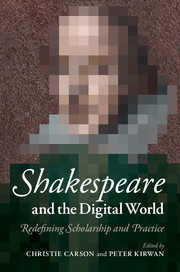Book contents
- Frontmatter
- Contents
- Notes on contributors
- Acknowledgements
- Shakespeare and the digital world
- Part I Defining current digital scholarship and practice
- Part II Defining current digital scholarship and practice
- Half-time: A pause for reflection
- Part III Redefining the boundaries and practices of Shakespeare studies online
- Part IV Redefining the boundaries and practices of Shakespeare studies online
- 14 Changing a culture with the Shakespeare Birthplace Trust
- 15 Developing a digital strategy
- 16 The impact of new forms of public performance
- 17 Creating a critical model for the twenty-first century
- Conclusion
- Index
- References
17 - Creating a critical model for the twenty-first century
Published online by Cambridge University Press: 05 July 2014
- Frontmatter
- Contents
- Notes on contributors
- Acknowledgements
- Shakespeare and the digital world
- Part I Defining current digital scholarship and practice
- Part II Defining current digital scholarship and practice
- Half-time: A pause for reflection
- Part III Redefining the boundaries and practices of Shakespeare studies online
- Part IV Redefining the boundaries and practices of Shakespeare studies online
- 14 Changing a culture with the Shakespeare Birthplace Trust
- 15 Developing a digital strategy
- 16 The impact of new forms of public performance
- 17 Creating a critical model for the twenty-first century
- Conclusion
- Index
- References
Summary
In approaching a collection of essays on developments in the digital humanities, one might question the validity of Shakespeare as a case study. However, I would suggest that the strength of the community of scholars who work in this field is that while the work encompasses the analysis of the approaches of actors, directors, playwrights and, increasingly, reviewers, librarians and archivists, within the society we live in today, as well as across many time periods and geographic locations, the subject field shares a common series of reference points. The plays, and the character situations they illuminate, provide an abundance of role models for critics to follow. In this final chapter of the final section of the collection I would like to look at the role of the critic of the future by testing out that role in Shakespearean terms. What sort of critical debate can an embattled academy have in the increasingly competitive but also incoherent online world? What follows is a contemplation of just some of the options available to us as a community, taking seriously, and for granted, the notion that there is value in focusing on ‘the analysis and creation of powerfully styled writing’ (O’Dair, 124).
Controlling the gaze in the new millennium
Feminist criticism has championed the importance of the personal account and has highlighted the individual experience as political since the 1970s. Laura Mulvey’s identification of the female viewer’s need to split herself into subject and object, being both the viewer and the viewed, to accommodate the mostly male director’s perspective, began a field of reception theory that has influenced performance criticism ever since. Experimental theatre, which changes from one performance to the next, also has required a critical response that is specific and personal.
- Type
- Chapter
- Information
- Shakespeare and the Digital WorldRedefining Scholarship and Practice, pp. 226 - 237Publisher: Cambridge University PressPrint publication year: 2014
References
- 4
- Cited by

